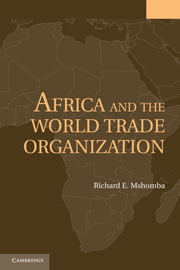Book contents
- Frontmatter
- Contents
- List of Tables and Figures
- Acknowledgments
- List of Abbreviations
- Map of Africa
- 1 INTRODUCTION
- 2 DISPUTE SETTLEMENT UNDERSTANDING
- 3 TRADE-RELATED ASPECTS OF INTELLECTUAL PROPERTY RIGHTS
- 4 AGRICULTURE IN THE DOHA ROUND
- 5 TRANSPARENCY IN GOVERNMENT PROCUREMENT
- 6 AID FOR TRADE
- 7 CONCLUSION
- Bibliography
- Index
5 - TRANSPARENCY IN GOVERNMENT PROCUREMENT
Published online by Cambridge University Press: 27 February 2010
- Frontmatter
- Contents
- List of Tables and Figures
- Acknowledgments
- List of Abbreviations
- Map of Africa
- 1 INTRODUCTION
- 2 DISPUTE SETTLEMENT UNDERSTANDING
- 3 TRADE-RELATED ASPECTS OF INTELLECTUAL PROPERTY RIGHTS
- 4 AGRICULTURE IN THE DOHA ROUND
- 5 TRANSPARENCY IN GOVERNMENT PROCUREMENT
- 6 AID FOR TRADE
- 7 CONCLUSION
- Bibliography
- Index
Summary
governments buy many goods and services. Government procurement policies can be significant in fostering infant industries, especially in developing countries. However, such policies can also serve as trade barriers. The WTO has a plurilateral Agreement on Government Procurement to prevent governments from having procurement policies that constitute trade barriers. To extend this discipline to all WTO members, developed countries would like to see a multilateral agreement, at least on transparency in government procurement. African countries are concerned, though, that such an agreement would hinder them in developing certain industries.
The magnitude of government procurement that is contestable (that is, potentially open to foreign competition) is sizable, ranging from 5 to 15 percent of GDP for various countries (OECD, 2002), as explained below. Government (or public) procurement is a subset of total government expenditure. It is the expenditure by the central government, states, provinces, local government, and government-owned enterprises for the purchase of works, services, and goods. It does not include, for example, wages and salaries, subsidies, transfer payments, and debt redemption. For the purpose of this study and to be consistent with the current WTO language and parameters, government procurement does not include defense spending either.
Interest in and international deliberations about government procurement are neither accidental nor new. The principle of non-discrimination for government purchases was included in the U.S. draft of the International Trade Organization (ITO) charter prepared soon after the establishment of the United Nations and the Bretton Woods institutions.
- Type
- Chapter
- Information
- Africa and the World Trade Organization , pp. 200 - 244Publisher: Cambridge University PressPrint publication year: 2009



